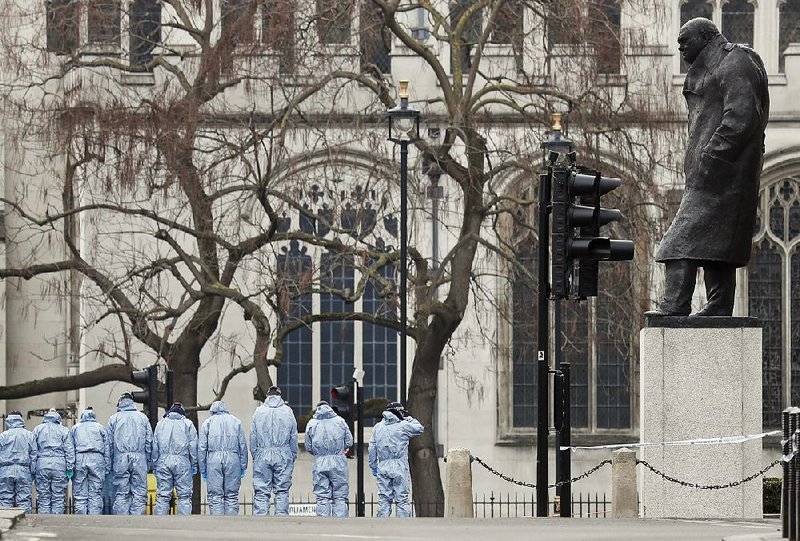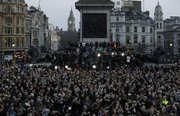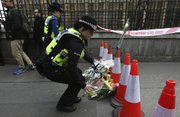LONDON -- British police identified Thursday the man who carried out Wednesday's knife and vehicle attack in central London. Khalid Masood, 52, was born in England and had a criminal record but was not suspected in any plot to "mount a terrorist attack," authorities said.
In a statement, Scotland Yard said Masood was not under any current investigations and had not been convicted of any terrorism-related offenses.
It said he was "known to police" and had a range of previous convictions regarding assaults, possession of offensive weapons and public order. His last conviction was in December 2003 for possession of a knife.
"There was no prior intelligence about his intent to mount a terrorist attack," Scotland Yard said. The agency gave no additional details about Masood.
RELATED ARTICLE
http://www.arkansas…">Speeding car raises alarm in Belgian port
Earlier Thursday, British Prime Minister Theresa May said Masood was once investigated for possible extremist links but was "not part of the current intelligence picture."
Wednesday's London attack killed three people -- an American man and British woman who were mowed down on the Westminster Bridge by an SUV driven by Masood, and a police officer stabbed outside Parliament. Masood was fatally shot by police soon after those attacks Wednesday.
May did not name the assailant in her remarks, but she offered new details about past scrutiny by authorities, who described the London attacks as "inspired by international terrorism."
Shortly after May spoke, the Islamic State-linked news site Aamaq carried a statement calling the attacker a "soldier" of the group's self-proclaimed caliphate. British authorities have announced no links between the suspect and the Islamic State, but the militant group has often independently asserted ties to various attacks around the world.
Across the English Channel in Antwerp, Belgium, authorities were placed on high alert after a man tried to drive a car containing weapons, including a gun, into a pedestrian zone.
Belgian police said the car, with French license plates, sped along the street, forcing people to jump out of the way. Belgian federal prosecutor Eric Van der Sijpt identified the driver as French citizen Mohamed R., 39, and said a long knife, a gun and a container with an unidentified substance were found in the car's trunk. Additional details were not immediately available, but the case was referred to Belgian federal prosecutors who are in charge of investigating militant attacks and threats.
In her statement to the House of Commons, May said the London assailant was born in the U.K. and was once investigated by security services "in relations to concerns about violent extremism."
"He was a peripheral figure," she said. "The case was historic. He was not part of the current intelligence picture. There was no prior intelligence of his intent or of the plot. Intensive investigations continue."
British media reported that Masood rented the Hyundai i40 that was used in the attack from a rental company in Birmingham, the U.K.'s second-largest city.
Meanwhile, police held at least eight people after sweeps in London and Birmingham linked to the investigation. About a mile away from the rental company in Birmingham, police guarded the entrance to the apartment building where one of the raids took place.
In London, Mark Rowley, the acting deputy police commissioner, said Thursday that 29 people were still being treated in the hospital, and seven were in critical condition.
"At this stage, we have no specific information about further threats to the public," he said.
A minute of silence, starting at 9:33 a.m., was observed in Parliament, Scotland Yard and London's City Hall to honor the victims of the attack. Slain police officer Keith Palmer's shoulder number on his uniform was 933.
Queen Elizabeth II was scheduled to open the new Scotland Yard building Thursday but postponed the ceremony, saying that her "thoughts, prayers, and deepest sympathy are with all those who have been affected by yesterday's awful violence."
Crowds gathered Thursday evening in Trafalgar Square for a memorial vigil. Flags flew at half-staff above the headquarters of the Metropolitan Police and Parliament.
Details of attack
Wednesday's attack -- which unfolded around some of London's most famous landmarks -- had similarities to previous attacks in Berlin and Nice, France, where vehicles were used as weapons.
The Hyundai targeted pedestrians along the bridge, immediately killing two people: Aysha Frade and Kurt Cochran.
Frade, a 43-year-old mother of two, was reportedly walking on Westminster Bridge on her way to pick up her children. Cochran, who was from Utah, was in London with his wife, Melissa, celebrating their 25th wedding anniversary. A third person who was injured on the bridge, an unidentified 75-year-old, died Thursday.
On Facebook, Melissa Cochran's sister said Cochran had died and Melissa Cochran had several broken bones. "While we are glad she survived, our hearts are broken and will never be the same after losing our dear uncle, brother-in-law, father," the woman wrote. "Kurt, you are a HERO, and we will never forget you."
In a statement released through the Mormon church, the Cochran family said the couple had been scheduled to return to the United States on Thursday.
In a Twitter post, President Donald Trump expressed "prayers and condolences" for the Cochrans' family and friends.
The people injured Wednesday included 12 Britons, three French schoolchildren, two Romanians, four South Koreans, two Greeks, one German, one Pole, one Irishman, one Chinese, one Italian and one American.
One Romanian woman who was walking along Westminster Bridge plunged into the Thames River and was pulled alive from the water.
At the United Nations, where the Security Council also observed a minute of silence, British Foreign Minister Boris Johnson said the international scope of the casualties "goes to show, an attack on London is an attack on the world."
"Our houses in Parliament have been attacked for centuries, by all kinds of people," Johnson told reporters at the U.N., but Britons' "ideals -- freedom, democracy, the equality of human beings under law -- are stronger than any adversary, and they will prevail."
After the bridge attack, the driver rammed the vehicle into the fence encircling the Parliament, then -- armed with a knife -- charged at officers stationed at the iron gates leading to the Parliament grounds. The attacker killed one officer and injured three, before he was shot and killed by police.
People in the House of Commons -- including a group of schoolchildren -- were placed under lockdown in the chamber for several hours after the attack.
Conservative lawmaker Nigel Evans said members of Parliament quickly realized how serious the situation was Wednesday. He said he looked down from a Parliament window and "saw the SWAT team coming in and shouting," and a terrified young researcher walking toward police officers with his hands up.
"That will remain with me," said Evans, who survived an Irish Republican Army bombing of Brighton's Grand Hotel during a Conservative Party conference in 1984. He said Thursday that he was "still in shock" after Wednesday's attack.
Tributes poured in Wednesday for Palmer, the 48-year-old police officer who was fatally stabbed. He was a husband and father who was unarmed at the time of the attack.
"He was a strong, professional public servant," said Parliament member James Cleverly in an emotional speech Thursday in Parliament.
Lawmakers also acknowledged Tobias Ellwood, a senior official at Britain's foreign office, who tried in vain to save Palmer's life.
Michael Fallon, Britain's defense secretary, said the security arrangements at Parliament, which has a mix of armed and unarmed officers, will be reviewed. He stressed, however, that "Parliament cannot be hermetically sealed."
The Palace of Westminster, the ancient seat of the British Parliament, is surrounded by high walls, armed officers and metal detectors. But just outside the compound are busy roadways packed with cars and pedestrians.
Information for this article was contributed by Karla Adam, Brian Murphy, Adam Taylor, Isaac Stanley-Becker, Rick Noack, Michael Birnbaum, Griff Witte, James McAuley, William Branigin, Carol Morello and Mark Berman of The Washington Post; by Jill Lawless of The Associated Press; and by Katrin Bennhold, Dan Bilefsky, Stephen Castle and Kimiko de Freytas-Tamura of The New York Times.
A Section on 03/24/2017




